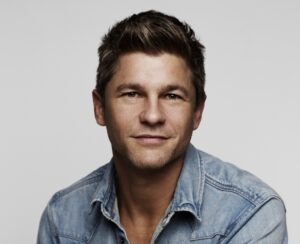WARDEL talks about his new music and being a part of the digital age

WARDEL. Photo Credit: Darcy De Los Reyes.
Singer-songwriter WARDEL chatted about his new music and being a part of the digital age.
With your appearance on “The Voice” Germany and “The Voice” in America performing pop music, you established yourself as an artist with millions of followers. Now, you set your sights on country music. What inspired the move to explore a new musical genre?
Country music has always felt right to me. Since my early military days, I’ve been drawn to it—the storytelling, the raw emotion—it’s so real.
After spending years making music in other genres, I realized I had a lot more to say, and country seemed like the perfect way to do that. It wasn’t about leaving anything behind; it was about finding a new way to express who I am now.
My prior music success came from charting in Germany nine times, which led to opening shows for major US acts while I was stationed there.
Then one day, a year after being selected for “The Voice of Germany” and declining, I was invited straight to the TV rounds—no audition needed—for “The Voice” in the US.
Just to clarify, I didn’t actually “appear” on the show in Germany or the US because we couldn’t come to an agreement on the contract terms—some of it was personal stuff in the contract that just didn’t sit right with me, and some of it had to do with my obligations to the military and national security.
The audition process was fun, the show producers were great, and I learned a lot from it, but ultimately, I had to prioritize my commitments.
How have your fans embraced your recent musical transition?
Man, my fans have been amazing. I was a little nervous at first, but they’ve really supported the shift. I’ve gotten messages from people saying they connect with the new music, and that means the world to me.
It’s cool to see that they’re on this journey with me, whether they’re old fans or new ones coming on board.
As someone considered a polyglottal (having command of many languages), how have your experiences as a linguistic specialist influenced your approach to songwriting and performance?
You know, diving into different languages and cultures really opened my eyes to how we communicate.
When I’m writing songs, I’m always thinking about how the words fall off the tongue and how it will hit people, whether they’re familiar with my background or not. It’s made me more mindful about the message I’m putting out there, and I try to make sure it connects, no matter who’s listening.
As today marks the 23rd anniversary of the events which took place on September 11, how has this tragedy impacted your life, and does it resonate differently being a military veteran?
September 11 is a day that’s always with me – I mean, having joined the military after highschool, it’s something that shaped my entire career. It’s a constant reminder of why I served and what I learned during that time.
The resilience and the spirit I saw back then—it’s something I carry with me, not just in life, but in the music I make.
What elements of country music resonate most with you, and how do they influence your songwriting?
Like I said before, for me, it’s the storytelling. Country music is all about telling real, relatable stories, and that’s what I’m drawn to.
When I’m writing, I’m focused on capturing those moments that we all experience—love, loss, redemption. Country just feels like the best way to get those stories out there in an honest, impactful way.
Given your exposure to various musical genres and cultures, how do you incorporate these influences into country music?
I think music is this universal thing that can cross boundaries, you know? So, when I’m making country music, I pull in elements from everywhere—whether it’s the structure from pop or rhythms from other cultures I’ve experienced.
It all kind of blends together to create something that’s uniquely mine, while still staying true to the heart of country.
As AI becomes a larger presence in the music industry, do you find it a benefit to the creative process or something more ominous to the future of music?
AI is definitely a mixed bag. It can be super helpful, like with production or exploring new sounds, but I think we have to be careful.
Music is such a human thing, and it’s important that we don’t lose that. So, while I see the benefits, I think it’s crucial to keep the heart and soul of the artist at the center of it all.
On a personal note, your longtime girlfriend is facing an uphill battle with health challenges. What advice do you have for others who are trying to balance the challenges of supporting a loved one while building a successful music career?
It’s tough, no doubt about it. My advice would be to keep your priorities straight—make sure you’re there for your loved one, but also take care of yourself. You can’t pour from an empty cup.
Communicate with your partner and your team, and don’t be afraid to ask for help. Remember, your career is a long game, so it’s okay to slow down when you need to.
Your father forged a major path in the world of bodybuilding. As he is your namesake, what aspects of his success and the way he raised you contributed to your success?
My dad’s work ethic and discipline definitely rubbed off on me—for better or for worse!
Watching him pour everything into something he was passionate about really taught me the value of hard work and perseverance. He always believed that if you put in enough effort, you could achieve anything, and that’s a mindset I’ve carried with me.
The biggest lesson from watching his career is understanding how tough it is to find balance in life. It’s not easy, but it’s necessary if you want to sustain success and happiness.
You’ve had many “lightning in a bottle” moments for a new artist. Your first single was quickly picked up by Spotify Editorial “Hot Country” playlist, performing on the Circle Country, and a rapid-fire invitation to perform on a 2024 CMA fest showcase stage. How do you harness this momentum to achieve higher levels of success?
Staying focused and setting new goals is key, but I couldn’t do it without the incredible support system around me.
My girlfriend Jannet, our families, and everyone who’s been part of my team, both past and present, have played a huge role in helping me keep this momentum going.
I’m especially grateful for my mentors, and my current Nashville team—Shelly, Denny, and Pete —they’ve been instrumental in guiding me and pushing me to reach higher. I’m always learning and adapting, and staying connected with people in the industry has been crucial.
I’m just trying to make the most of every opportunity, and I feel like it’s all part of a bigger plan. God knows what He’s doing, and I’m grateful to have such a strong team to help me follow that path.
What advice can you provide aspiring artists about using music competitions to propel your career?
Music competitions can be a great way to get your name out there, but being an artist is about so much more than just singing songs or winning a talent show. The reality is, only a few people really see lasting success from that.
I wasn’t even aired on The Voice, so I didn’t gain anything tangible from it. In fact, because of that, I don’t even like to claim that I was part of the show—But it was still an important part of my journey.
It taught me a lot about the inner workings of the industry, and I’ve dodged quite a few bullets because of what I learned.
That contract allowed me to separate from the military after 10 years instead of waiting out the last two years of my contract, giving me the chance to fully pursue my music career—which I’m also grateful for.
That experience inspired me to dive deeper—I ended up studying and graduating from three different music programs to learn the business and become more than just a singer.
Now, I see myself as a bit like Berry Gordy, developing and mentoring young artists, and like Billy Sherrill, shaping a unique sound for my own country music.
My advice? If you’re a singer, have fun and sing your heart out. If you’re an artist, use the experience as a development tool and soak up whatever you can learn from everyone and everything around you.
Also, build relationships with people in the industry. Stay true to yourself as an artist, and if you’re serious about this, you may want to use that exposure to push your career forward, whether you win or not. But most importantly, do what’s best for YOU, not just your career.
For me, walking away from that show (“American Idol” and “The Four”) was what I needed to do for myself, and I know those shows were meant for someone else. It’s easy to get caught up and end up committing to a life you never really wanted.
So, keep your priorities in check and stay grounded.
What exciting projects do you have coming up?
As life keeps life-ing, I’m diving into some new music that I’m really pumped about—stuff that goes even deeper into the stories I want to tell. I let new experiences and thoughts inspire the music, and I try not to overthink it.
Sometimes ideas come from others, and sometimes it’s just a need to get something off my chest, whether it’s about what’s happening in my life or what I’m seeing in the world around me.
I’m also working on ways to bring my fans into the creative process, which I’m super pumped about—I really believe fans deserve to be rewarded for their support, and I want to be a pioneer in making that happen!
Plus, there might be some cool collaborations in the future, but I can’t say too much just yet. There’s definitely a lot to look forward to!
To learn more about county singer-songwriter WARDEL, check out his official website, and follow him on Instagram and Facebook.
WARDEL talks about his new music and being a part of the digital age
#WARDEL #talks #music #part #digital #age





